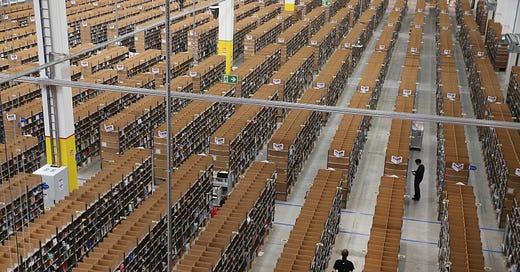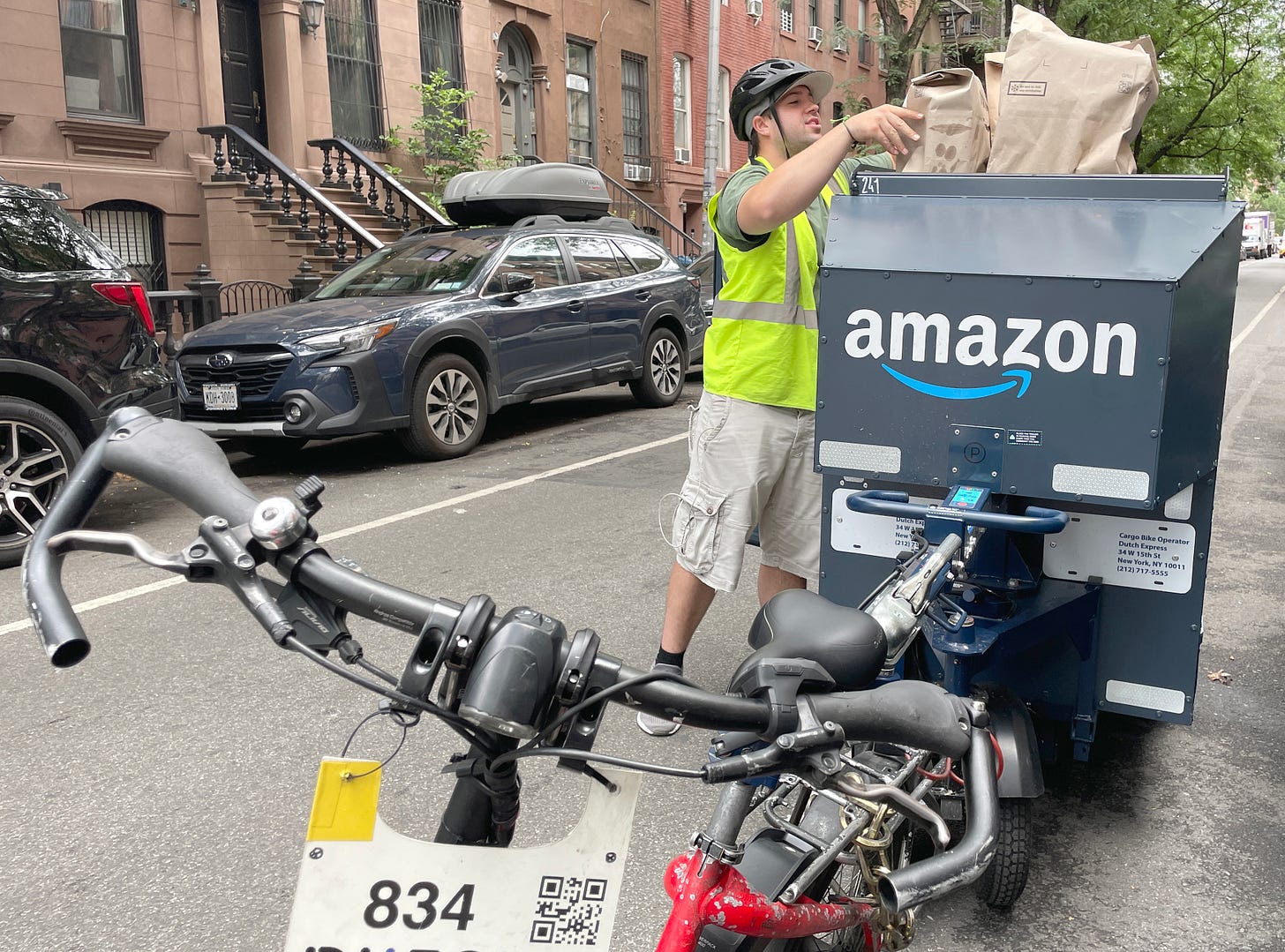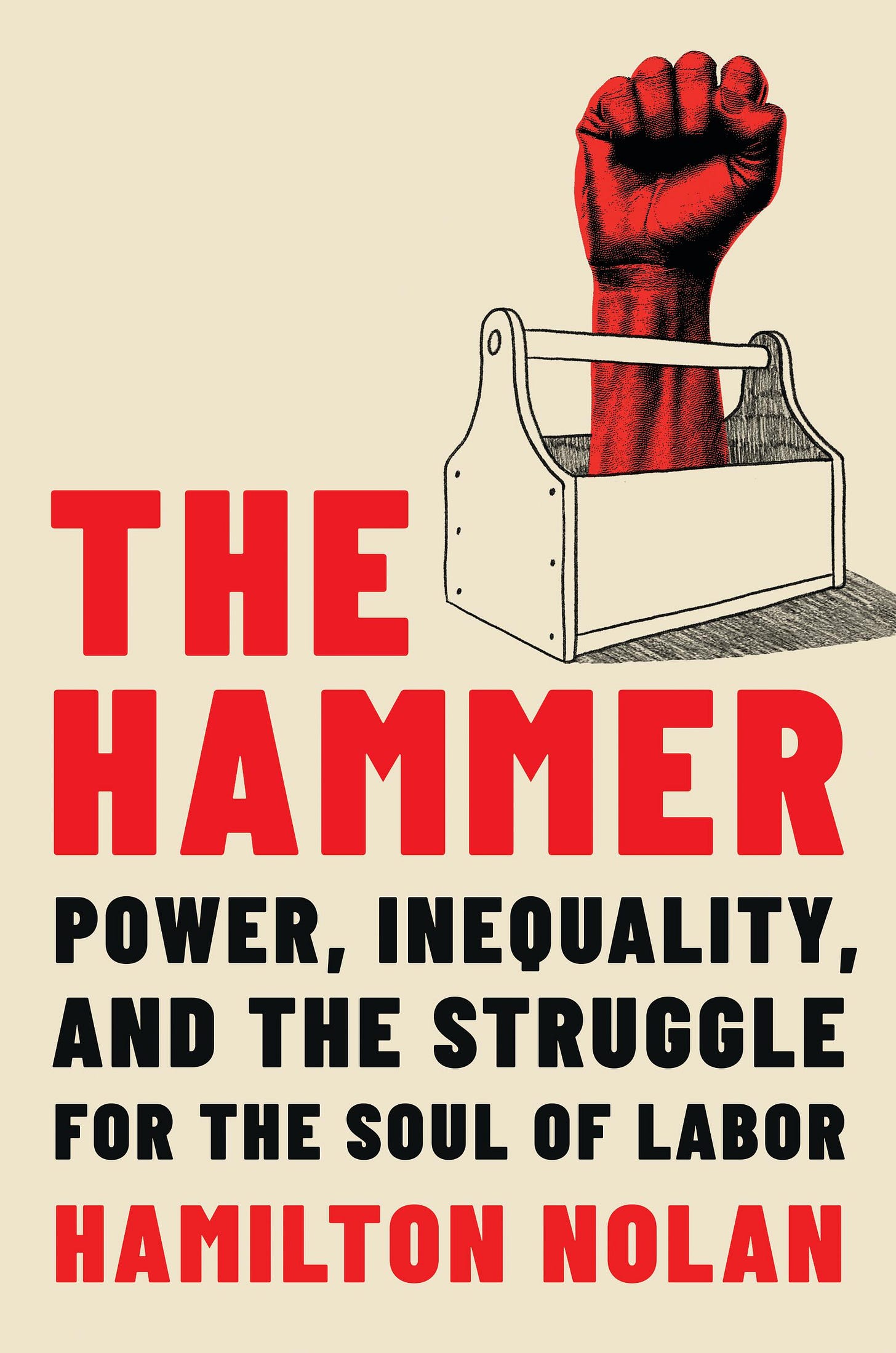If you want to have a system in which the power of capital is fairly balanced out by the power of labor—resulting in shared prosperity, rather than a tiny sliver of people getting super rich—then it is necessary for organized labor to be present in the most important parts of the economy. Not only because unions must go wherever jobs go, but also because organizing key companies and sectors can raise the bar on wages and working conditions and wages for entire industries and the economy more broadly. A major reason why America has so much economic inequality today is because this is not the case. We have a mere ten percent union density. When you envision the road out of this mess, it inevitably involves organizing the most important companies.
Let’s take Amazon, for example. It’s worth $1.85 trillion and it has entirely remade the way that Americans shop, and work. It has been clear for many, many years that Amazon must be a top target of organized labor. Yet unions have had little success. There is one (1) officially unionized Amazon warehouse in the country, out of hundreds, and they are miles away from getting a first contract, because Amazon will spend an infinity amount of money using every last legal mechanism to drag out the process of getting one. Last week, though, brought some good news: a regional director at the NLRB determined that Amazon is in fact a “joint employer” of its delivery drivers. The company has long tried to maintain the fiction that its delivery drivers are not its employees by subcontracting the work out to hundreds of smaller firms, even though drivers wear Amazon uniforms, and Amazon dictates the conditions of their employment. Being officially branded a joint employer means, importantly, that Amazon must bargain with its delivery drivers if they unionize. Given the fact that any incursion by unions into Amazon is a big fucking deal, this ruling, by extension, is a big fucking deal. The project of “organizing Amazon,” in the best case scenario, will really look like dozens or hundreds of smaller union drives to organize warehouses and delivery drivers and Whole Foods workers and customer service agents and etc. Naming Amazon a joint employer strips away one way they have legally insulated themselves from union drives, in one segment of their work force.
So this is good. But now, my friends, let’s do a little mental exercise. Let’s think through the steps that would have to happen to actually unionize Amazon. This joint employer ruling, for example, is only the first step in a long process. Per Bloomberg, “If Amazon and the Teamsters don’t reach a settlement, the regional director will issue a complaint, prompting a hearing with an administrative law judge. Whoever loses that decision will likely appeal to the full NLRB, then to federal court—a process that could take several years.” If the NLRB is still controlled by Democrats, the union can expect a favorable ruling there. But in federal court? And then, perhaps, in the Supreme Court? Much more dicey prognosis.
And how about getting a contract negotiated for the Staten Island Amazon warehouse that already voted to unionize? That vote was in April of 2022. Amazon challenged it on every stupid legal ground. They lost that challenge at the NLRB in January of 2023. But! Then they proceed into federal court, to relitigate every last bullshit point of it. Potentially, one day, all of the legal maneuvering will be exhausted, and a judge will order Amazon to bargain a contract, as they are legally required to, and at that point, Amazon will stall until the union drags it back into court once again. And in the meantime Amazon is challenging the constitutionality of the NLRB itself, willing to bring down the entire post-New Deal social order if that’s what it takes to not have a single union contract in its company. While all of this is playing out, many or most of the people who were working in the warehouse and voted to unionize in the first place will move on to other jobs. If the union succeeds in the gargantuan task of organizing another warehouse—during which time Amazon will blithely lie to and retaliate against and fire workers illegally, because penalties for doing so are so weak that it makes sense for the company to break labor law—then this entire legal process will start over again at the new warehouse. Repeat that a hundred times or so, and you’re really getting somewhere!
I say this not to denigrate the importance of what the union has done at Amazon; on the contrary, it is one of the most important battles in the entire labor movement. I say it instead to try to lend some perspective to the scale of the playing field that this battle needs to take place upon. Global capitalism is a beast. Often, the discussion of companies becoming too powerful happens through an antitrust lens, with the focus on market power that is used to squeeze the public. But looking at it through the lens of labor, I think, makes it easier to grasp. “Market power” is an abstract term, but most of us have known some version of working in a shitty job for an enormous company with policies that suck and looking around one day and thinking, “Holy hell, how the fuck would I change this machine even if I wanted to?”
Generally speaking you have organized labor on one side and corporations on the other side and then each side trying to gain control of the government in order to get the assistance of the decisive power of the state. In America, corporations won this push-and-pull long ago. After WW2, labor looked too strong, so laws were passed to rein in the boundaries of what unions could do, and unions began shrinking, and they haven’t stopped shrinking since. A quick and easy way to understand the entire Republican governing philosophy is “the government using its power on behalf of capital rather than on behalf of labor.” This general trend has held true not only in America but throughout the Western world.
Global corporations are like organisms, programmed to grow and dominate. National governments are, to them, only stumbling blocks. All regulation that constrains profits is something to be evaded or destroyed. This basic orientation will never change. It takes little imagination to understand how dangerous this is. Not only do we need state power to be aligned with labor; we need to pray that the combination of state power and organized labor is adequate to counterbalance the power of global capital. That is very much an open question.
When you see grocery chains fighting in court for the right to do megamergers, or Uber trying to use the power of big data to evade European laws, or Tesla stubbornly refusing to acquiesce to Sweden’s long established labor system, these are all manifestations of the battle that will never end—the battle of global companies to break free of all constraint, to maximize profits, to dominate. This is their nature. They will never stop doing this any more than a tiger will stop pacing in its cage. They will always try to escape the cage and eat you. Always. If you allow them to seduce you with statements about public-private partnerships and job creation and building a strong economy together, you will surely end up in the cage yourself.
What will it take to organize Amazon? It will take the combined resources of the entire labor movement feverishly organizing Amazon workers and the federal government twisting the company’s arm hard enough to force them to come to the bargaining table. This is not impossible. We saw it happen, at a smaller scale, with Starbucks—a union drive took off and we had a fairly pro-union president who appointed a strongly pro-union NLRB and pro-union members of Congress dragged the Starbucks CEO to Capitol Hill and harangued him about union busting and a public boycott of Starbucks caught on and eventually the company gave in and said, yes, it would bargain a contract with the union. Should it take all this fucking struggle to get an allegedly good corporate citizen to do something that it is legally obligated to do already? No. Like all major corporations, Starbucks is the equivalent of a sociopath. But they were, in fact, forced to the table, through a combination of all of the above factors. It can work. It’s just a big, big fucking ordeal.
In a rational world, governments would treat companies like criminals on parole. They would ankle monitor them and say, “You can only go to work and do your job, that’s it. You can’t fund candidates for office who will rewrite the laws in your favor. You can’t run advertising campaigns to lure people into your house. Do the one thing that you do and collect your pay and shut the fuck up.” That is the arrangement that we should hold in our minds as a goal. I realize that this is all rather broad, but it is useful to always remain conscious of the fact that corporate power is, at all times, trying to dominate the world, and that it is the project of democracy to stop it, and that its capture of the state should be despised and avoided everywhere it manifests itself. Workers are people. Companies aren’t. Every single union contract is a small step towards keeping the world out of the hands of the evil robots.
Related: The Hammer, Not the Handshake; Trampoline Unionism; “What Can I Do to Help the Labor Movement?”
More: “The Hammer” Book Tour
I wrote a book about this very topic, my friends. It’s called “The Hammer,” and it is available for purchase wherever books are sold. Furthermore, I’m still on book tour! If I come to your area, come out and let’s talk about how the labor movement can save the world! Fuck yes! Upcoming events:
Saturday, August 31: Wheeling, West Virginia. I’ll be speaking at the Reuther-Pollack Labor History Symposium at 11 a.m. Tickets and event info here.
Thursday, September 5: Las Vegas, Nevada. At The Writer’s Block at 7 pm. In conversation with Ted Pappageorge, secretary-treasurer of the Culinary Union. Event link here.
Wednesday, September 25: St. Augustine, Florida. I’ll be speaking at Flagler College in the evening. Event link to come.
Thursday, September 26: Gainesville, Florida. At The Lynx Books at 6 pm. In conversation with labor activist Candi Churchill. Event link here.
Sunday, September 29: Brooklyn, NY. At the Brooklyn Book Festival.
Finally: Thank you to all of you who subscribe to How Things Work. This is pure and uncut independent media, which is another way of saying “I make a living only if you, the gentle reader, choose to kick in a few bucks, and otherwise, I don’t.” If you like reading this publication and would like for it to continue to exist, please take a second and become a paid subscriber right now. It’s affordable. It’s a good cause. And I will write very flattering things about you when I sign your book one day. Peace, my friends.







I might believe in the legal fiction "corporations are people" if ever I saw a corporation go to jail.
The attempted dismantling of the NLRB should be a five alarm situation for everyone even vaguely left of center, and it’s wildly disturbing to me that it’s only really being talked about among labor nerds. Great piece.
Speaking of NLRB, what happens if the original union organizers do move on to other jobs? Are there requirements that if/when a first contract can finally be bargained, that there has to be any continuity with the original employee organizers? Would love a deep dive on the experiences of negotiating first contracts for new unions.